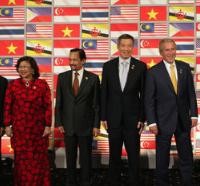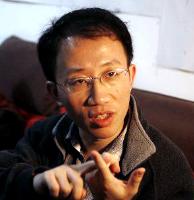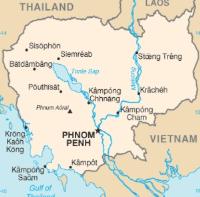Looks like Russia is about to suffer some more strategic fallout from the Georgia War, to the tune of $20-30 billion in direct and immediate loans to its oil industry from China. That, in return for guaranteed exports of two billion barrels a year for 20 years. Obviously, Beijing is having some trouble digesting Russia’s recognition of the separatist provinces. Seriously (or if not seriously, then with slightly less irony), it’s quite a bargain compared to what we’ve spent in Iraq securing our oil imports for the next twenty years. Moscow and Beijing are also talking about dispensing with the […]
China Archive
Free Newsletter
A couple of articles in the French language press (one this weekend in Le Monde, the other today in Le Figaro) indicate that, contrary to what I’d expected, Russia is in fact annexing South Ossetia and Abkhazia on the installment plan. Apparently most of the political leaders installed in the two provinces are Russian (the new South Ossetian prime minister is a product of the Russian security forces), a rail bridge that linked the Abkhazia’s ethnically Georgian populaiton to Georgia has been blown up, and negotiations are under way for pemanent military bases. (I imagine that bargaining will be less […]

PHNOM PENH, Cambodia — In search of raw materials, China has increasingly used development assistance to court Cambodia, Laos, and Vietnam, three countries “forgotten” since the Vietnam War. The U.S., too, has stepped up its activities in the region since the Sept. 11 attacks, although its efforts have focused more on counterterrorism cooperation than on directly addressing the growing Chinese influence. But as Southeast Asia increasingly becomes the object of the two powers’ attention, some in the region are expressing discomfort with their growing rivalry. A January 2008 report (.pdf) by the Congressional Research Service (CRS) noted that China outpaced […]
I mentioned the other day that while China had turned down Pakistan’s request for a loan, it had agreed to sell it two nuclear reactors. Given Pakistan’s non-NPT status, you might be wondering how China can do that without approval by the Nuclear Suppliers Group. James Acton at Arms Control Wonk explains that it can’t, but that it really doesn’t matter: But, realistically, all the NSG has at itsdisposal to enforce its rules is the restraint of its member states. IfChina does sell the plants to Pakistan what’s the NSG going to do? Write China a very strongly worded letter? […]
A few months back I was talking with an aquaintance in the telecom industry. I mentioned an article I had just read about leading Chinese telecom companies choosing 3G standards that weren’t compatible with international norms. Her response was basically that when you have the kind of domestic market that China has, international norms will eventually come to you. Fast forward a few months and a couple economic meltdowns later and we find, via an excellent NY Times piece, that when the U.S. (and the world) sneezes, China might not catch cold, but it does reach for its handkerchief. Among […]
You’d think that if China is wary of Islamic separatists destabilizing Xinjiang, the two things it wouldn’t want to do is outlaw Muslim practices in the province and allow Pakistan to self-destruct.The former creates the kind of resentments that fuel insurgencies, andthe latter creates the kind of safe havens that harbor them. Despite turning down Islamabad’s loan request, though, China’s “due diligence” didn’t stop it from promising to help Pakistan build a couple nuclear reactors. Those things ain’t cheap, of course, but at least they’re C.O.D.
From the NY Times (via Small Wars Journal), President Ali Zardari of Pakistan is headed to China, Pakistan’s longtime ally and hedge against India. My first thought was that if politics is war by other means, then this represented Pakistan’s efforts to find a way of waging its war against domestic terrorism independently of America’s regional interests. But Arif Rafiq, my source for all things Pakistan over at The Pakistan Policy Blog, is quoted in the fourth paragraph of the piece as saying: . . .”the two closely timed visits to China by President Zardari and General Kayani are not […]

NOBEL PEACE PRIZE DRAWS SCRUTINY — The impending announcement of this year’s Nobel peace prize winner is drawing more speculation than usual from human rights advocates, the media and governments, as 2008 marks the 60th anniversary of the Universal Declaration of Human Rights. Most observers believe the nominating committee, which is scheduled to make its selection announcement Oct. 10, will pick an individual or group involved in human rights, with the winner most likely related to China. While speculation regarding a China-related winner has been growing for several years, many observers believe that concerns over how such a move would […]
As sometimes happens when blogging, I read a Fareed Zakaria article on the two presidential candidates’ vision of the world, had a quick thought about whether the U.S. can counter or only channel the emerging powers, dashed it off and largely forgot about it. Then Nikolas Gvosdev happened across my post, had a less hurried thought about the relative “brittleness” of Russia and China and the implications for countering vs. channeling them, and developed it. And before you know it, Kal at The Moor Next Door has a leisurely and very well formulated thought about the limits of both China […]

PHNOM PENH, Cambodia — U.S. policymakers have raised security concerns about radical Islamic charities in Cambodia after delegations from Kuwait and Qatar promised $700 million in soft loans and investment for the country’s embattled infrastructure. In an August speech, U.S. ambassador Joseph Mussomeli said militant groups are vying for influence over the country’s Cham Muslims, and that Gulf states should “be careful” where the money goes. Gulf delegates dismissed U.S. worries, claiming their interests in Cambodia — garnering food security by investing in Cambodia’s unused rice fields — are economic, not cultural. But with $5 million of the loans earmarked […]
